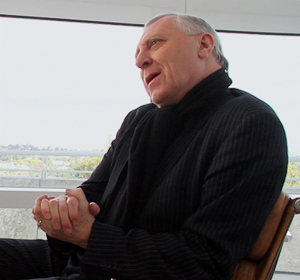For our Getty Perspectives lecture series, filmmaker Peter Greenaway came to speak about his new work creating immersive environments inspired by masterpieces of European painting. At the event, and on Facebook and Twitter, we put out the call for your questions—and he agreed to sit down with Peter Tokofsky from our Education Department and answer them.
Don’t expect the man who transformed Leonardo’s Last Supper into a multimedia extravaganza to give a plain answer. Instead, drink in some brilliant and unorthodox observations on narrative, art, mimesis, sex, death, and permission to fail.
Running time 30:29. Please note that there are a few instances of strong language around 8:10.
[audio:http://www.getty.edu/museum/programs/past_programs/greenawayaudio/greenaway_interview.mp3|bg=0x6699cc|righticon=6699cc|loader=0x6699cc|titles=Peter Greenaway on cinema, art, sex, and death]
Peter Greenaway at the Getty Center
1. September 31, 1983, Greenaway says, is the day cinema died. Is this date anything more than just a random day?
Yes, it is. (Sort of.) 1983 is the beginning of the digital revolution, and autumn is the time of changes.
2. Is narrative in cinema really dead?
Try this experiment: Pick a famous movie—Casablanca, say—and summarize the plot in one sentence. Is that plot you just described the thing you remember most about it? Doubtful. Narrative is a necessary cement, but it disappears from memory.
3. How do we create new cinematic experiences that top the shock and breakthrough of early experiences such as Salvador Dali’s Un Chien Andalou?
Can we? Perhaps not. Cinema, which demands suspension of disbelief, is an increasingly naïve proposition. Look at what we demand of it: sex, mostly; sex and death.
4. If Greenaway’s projects require immersive environments, does that mean he’s abandoning the commercial theater for good?
Not if he wants to pay the rent! But he’d like to make films the way a painter paints paintings—with low technologies and permission to fail.
5. Greenaway has stated that his films will never be the same length twice. This implies the use of improvisation. Is that correct?
Why do we have to believe in the notion of permanence? A play can become a film, which can become a TV series, which can become an exhibition of photographs. Today, we have room to maneuver—even if we’re only making movies for one guy and his dog. Or just the dog.
6. Thirty years ago, everyone wanted to be a film director. Now, Greenaway has said, everyone wants to be a curator. So is he a curator now?
Thanks to secondary education and the Internet, we’re all knowledgeable now—if knowledge means the accumulation of facts. Curators are those who know how to maneuver around that knowledge. They are our new apostles of knowledge.
Text of this post © J. Paul Getty Trust. All rights reserved.




Comments on this post are now closed.